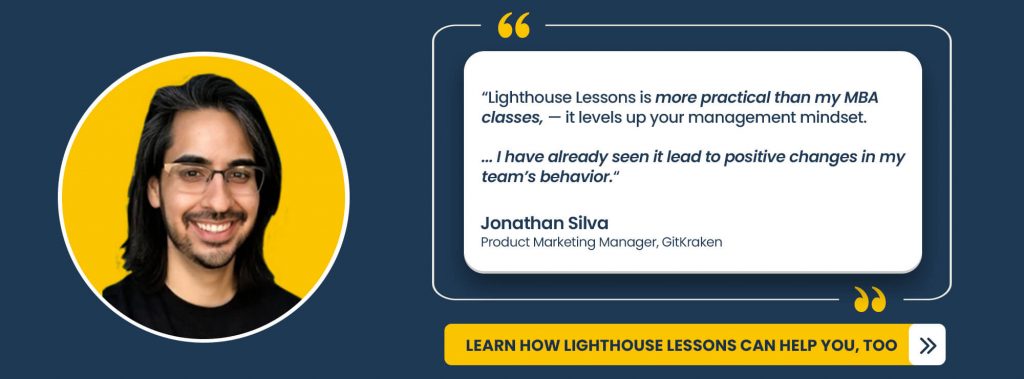To be a great leader, you need to develop many skills: emotional intelligence, the art of giving good feedback, influencing others, managing up, and more.
Yet, above all those skills is one that with it, will carry you far, and without it, you will struggle. It's one that gets harder the busier you get, and even the best leaders catch themselves missing.
The hardest skill of all for managers: Self Awareness
I've been writing and researching leadership for the Lighthouse blog and our product for managers for almost 4 years. Before that, I was a regular reader of leadership books, and have managed teams for over a decade.
Despite all that, I still struggle with self awareness every day.
It's a skill that requires constant vigilance, and steady doses of humility.
When you least expect it, when you think you're doing okay, or you get even a little behind on work, it sneaks up on you:
- You get into a meeting and totally miss how you came off to a team member.
- In a hurry, you send an email that's more terse than you meant.
- Or, you get into an argument with someone, forgetting that's when you both lose.
Maintaining self awareness can feel like a never ending battle with yourself and your surroundings.

Why is self awareness so hard?
If you've ever heard about someone in an operating room that claims to have an out of body experience, it sounds pretty cool: they're floating in a room, and they can observe everyone around them. They see themselves on the table, and all the surgeons, nurses, and others in the room working furiously.
If only we could similarly observe ourselves, managing would be a lot easier.
It's why it's often so much easier to coach someone else you observe, than correct yourself.

We are all stars of our own movie.
As Scott Adams writes about on his blog and in his book, part of consciousness is the lens we view the world through:
"...humans rarely (if ever) do anything because of logic and reason. The part of us we consider rational is in reality a rationalizer. Your mind is creating little movies in which you are the star."
When you are the star of your own movie, you are biased by a combination of what we observe and the current narrative we are rationalizing:
- Think someone is honest? Then everything they do gets the benefit of the doubt.
- Worried about a problem on your team? You're more likely to pattern match issues to that problem.
While in many scenarios, your movie as leader can be healthy and productive (for instance, holding yourself to the ideal of the kind of leader you dream of being), without a regular dose of self awareness, you're likely to fall off track.
Today, we examine why self awareness is so hard, share examples of how others have developed their self awareness, and point you in the right direction to building your own self awareness skills.
Table of Contents: How to Develop Your Self Awareness Skills to Thrive as a Leader
- Build a mindset of humility
- Seek out feedback and other perspectives
- Take real time to reflect every week
- Self awareness is a never ending journey

How to Develop Your Self Awareness Skills to Thrive as a Leader
"Ugh, what a hypocrite."
Few phrases evoke more resentment toward a manager than when their team feels like they are a "do as I say, not as I do" kind of person.
However, when you lack self awareness, that is exactly the kind of negative thoughts you can generate in others.
Embrace learning every day.
No manager has seen it all. There's always new situations, shifts in circumstances, and changes in levels of pressure. As you navigate your workplace, you're going to make mistakes. No one is perfect. (This post author included; I wrote this post to help me, too).
Fortunately, if you have a growth mindset, you know that any weakness you have can be overcome through effort and learning. Self awareness is a skill to learn like any other.
So how do you build up your self awareness so you make fewer mistakes? How can you make the movie of who you hope you are more in line with the reality of what those around you see?
Let's dive in.
If anyone tells you that a person speaks ill of you, don’t make excuses about what is said of you, but answer: ‘He does not know my other faults, or he would not have mentioned only these.’
— Dr. Jabe Bloom (@cyetain) April 8, 2018
— Epictetus
1) Build a mindset of humility.
Cocky, overconfident leaders lacking self-awareness are always eventually exposed. Sometimes this can take a long time, but the fall is all the harder then. This can manifest in many forms:
- A Startup CEO who assumes money will always be easy suddenly can't get their next round of funding and has to lay everyone off and fire sale their business without warning.
- An executive that ignores warning signs about harassment issues suddenly finds their organization in the press for all the wrong reasons and then forced to resign.
- A manager who is a jerk to their team suddenly finds their employees all quitting in a wave of resignations, leaving them unable to continue to hit their goals.
While these are extreme cases, they illustrate the consequences for losing humility for the work you do as a leader.
Follow the Golden Rule of Leadership
If the Golden Rule in life is to, "do unto others as you would have them do unto you," then the Golden Rule of Leadership is:
You are responsible for everything that happens on your team.
One of the easiest ways to start to improve your self awareness as a leader is to look in the mirror first.
When things go wrong, do you point fingers, or start by looking at how you contributed to the issue?
But...but...but...
I know, I know. You already can think of plenty of examples where it's not your fault! Guess what: it's still your fault.
- "It's not my fault the engineer deleted the production database doing something stupid"...but it is your fault you hired them, and didn't put in sufficient safeguards to prevent that from happening.
- "I had no way of knowing those two employees would get along so poorly"...but it is your fault for not intervening before it got ugly.
- "They lied to me"...but you trusted without verifying.
- "I can't be everywhere at once and this happened when I was doing something important"...but you didn't listen to your team or create a way for others to help you catch problems by safely coming to you about things you weren't around for.
- "This happened 3 layers below me in my organization"...but you are a senior leader who must set and hold the standard all the way down.
Following this Golden Rule is less about the situation or circumstances, and more about the mindset. By always starting with yourself, you change how every problem is dealt with in a massively positive way.

Accepting responsibility, and doing something about it.
When you see a problem and start with yourself, it changes everything:
- Group Accountability: You make it safer for your team to admit their mistakes that may have contributed to the issue, too.
- Get to the Source: It can help you look at the big picture of the processes and unspoken values of your team to find root causes.
- Cooler Head: You are more likely to calmly approach the problem instead of being angry and aggressive.
Most importantly, you build credibility with your team. When you show you're willing to own up to your mistakes, it makes your team more willing to believe in you as their leader.
Given the choice, everyone will choose a leader who owns up to mistakes and fixes problems over having a boss who points fingers and sweeps their mistakes under the rug.
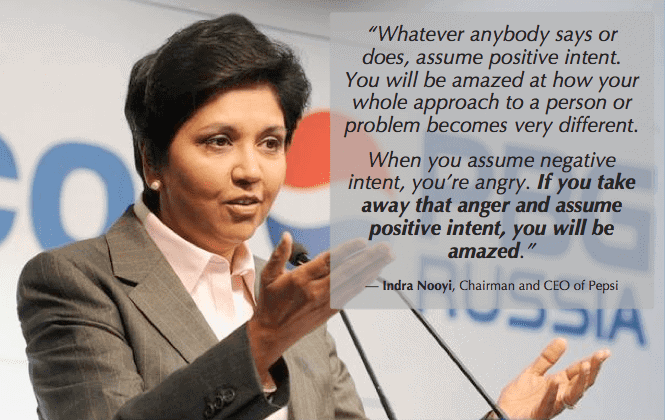
Assume Positive Intent
Remember: we are all stars of our own movie in our head. You know you had good intentions with the mistakes you've made. In the vast majority of cases, so will those on your team.
If you start out looking at your own faults and contributions to a problem, it will be easier to assume positive intent in others as well.
Do not underestimate the power of that mindset when you need to talk to someone about a mistake or problem. It can make all the difference in them being comfortable being honest, or twisting their story to try to protect themselves or others.
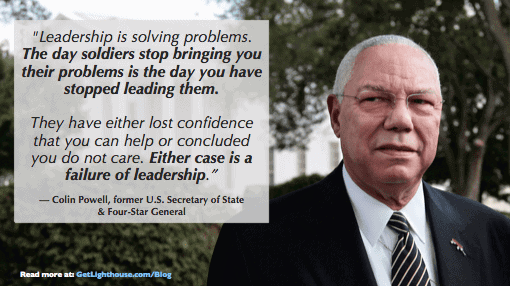
2) Seek out feedback and other perspectives.
Now that you're starting to look at yourself first when things go wrong, the next step is to seek out feedback.
You can only be one place at a time. The only way to scale yourself is to leverage your team as a way of seeing what you're not around for.
Develop the skill of asking good questions
If you wait for problems to come to you, it's often going to be too late. It's a great way to trap yourself in a fire-fighting, reactive management mode.
You must seek out problems to find them faster. This means asking good questions of your team regularly. Be curious.
You're also not going to be able to always zoom out in situations and understand how you're perceived or how others are thinking. To shortcut that challenge, all you have to do is make time to ask your team.
This is why we spend so much time advocating for 1 on 1s here on the Lighthouse blog. It's why we built a product to help you make the most of your 1 on 1s.
They're your best time to get candor from your team, and ensure you have time on your calendar to seek out feedback.
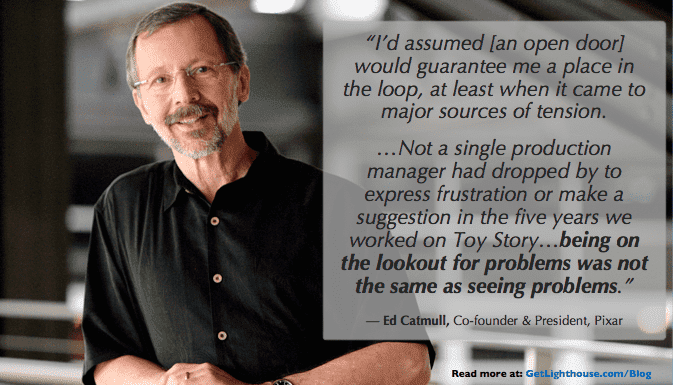
Your open door policy will always fail you
It sounds so great. You open your door, tell your team you're available, and wait for them to come knocking with all the feedback and insights you hope to hear.
Unfortunately, it works out about as poorly as things did for the person who built a better mousetrap and assumed people would beat a path to their door.
Your open door policy will fail for a variety of reasons:
- Fear of approach: It can be scary to come to your manager with an issue. Is it worth bringing up? Will you be labeled a complainer?
- Is the door really open? If they're remote, they may not know when you're available, and even in office it only takes you turning them away only once to think it's not worth trying.
- You will be unprepared: When they come knocking, you're likely going to be in the middle of something else. Will you really be at your best to discuss whatever surprise they bring?
Instead, you need to make regular time to talk with your team to get feedback.
Try it in a variety of ways: 1 on 1s, blameless post-mortems, town hall meetings, etc. There's no silver bullet, but many lead bullets will do the job.
Listening and taking action from all of these approaches will dramatically improve your ability to learn about problems, which will include you being more self aware of your own shortcomings to work on.
You won't know unless you ask. And when you do, while you may not like everything you hear, it will dramatically improve your self awareness, and ability to stay grounded and effective as a leader.
Want to go deeper in developing your skills of asking good questions and getting more feedback from your team? Start here:
- Learn how to get more feedback from your team here.
- Discover the power of asking "what" and "how" questions here.
- Find out the many detailed reasons open door policies fail here.
- Get over 100 questions to ask in your 1 on 1s with a free trial of Lighthouse here

3) Take real time to reflect every week
The more intentional you become about improving your self awareness, the better you'll become at it.
Once you master getting feedback and observing yourself when you can, you'll be ready for Jedi-level skills. That's when you can start to realize how your actions can impact others.
The Placebo Effect of Management: The Hawthorne Effect
A placebo is used in medical studies to ensure that a drug that's being tested provides real results. Researchers will compare a new medicine's impact to those in the same study that are taking an empty pill, or placebo. This is necessary because of the "Placebo Effect," which is a, "psychological phenomenon, in which the recipient perceives an improvement in condition due to personal expectations, rather than the treatment itself."
A similar thing happens with managers and their teams, called the Hawthorne Effect, which I learned about in What Got You Here, Won't Get You There by Marshall Goldsmith:
"Productivity tends to increase when workers believe that their bosses are showing a greater interest and involvement in their work.”
A great manager realizes this is powerful on 3 levels:
- Simply doing anything to be more hands on is going to improve your team members
- You get instant momentum for free, before any changes you make have an impact
- When you want to strategically improve someone, remember to apply this as a first step towards improvement
However, you only begin to recognize these kinds of opportunities if you make time to think about it.

Are you taking time to pause and reflect?
Ben Franklin was a legendary American. He discovered electricity, invented bifocals, helped start our modern fire departments, was a key diplomat during the American Revolution, and an essential framer of the US Constitution. His incredible biography by Walter Isaacson is an inspiring read.
But he wasn't always such a great man.
In fact, he was hated by many in his early years. He lacked self awareness.
Fortunately, as Isaacson writes, a Quaker in Philadelphia took him aside and told him he was disliked by many. It was this feedback that set Franklin straight and set him on the path to greatness.
After that sober conversation with the Quaker, Franklin dedicated himself to self improvement. He made a list of 13 virtues he wanted to begin to live, and took time each day to reflect on how he did.
While it was painful at the start, he eventually got to the point where he could go months without having to mark a failure in his notebook used to track his virtuous progress.
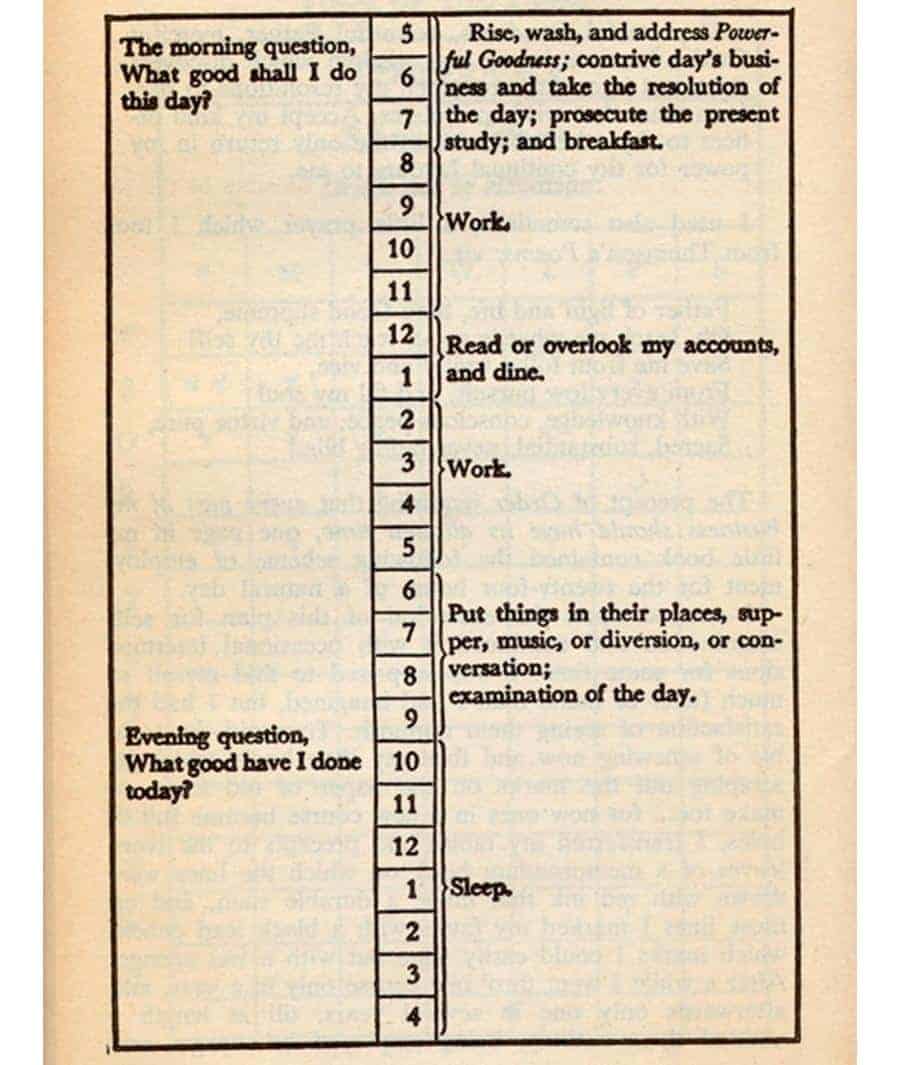
Schedule reflection like you would any meeting or event
If you want to get stronger, you need to make time to lift weights. If you want to be a better speaker, you have to practice giving speeches.
Making time for proper reflection is the best way to improve your self-awareness.
You may not have time to do it every day like Franklin did, but even once a week can make a tremendous difference.
In Dale Carnegie's leadership classic, How to Win Friends and Influence People, he shares a story of how one student of his courses changed his leadership for the better:
"The president of an important Wall Street bank once described...a highly effective system he used for self-improvement. This man had little formal schooling; yet he had become one of the most important financiers in America, and he confessed he owed most of his success to the constant application of his homemade system:
For years I have kept an engagement book showing all the appointments I had during the day. My family never made any plans for me on Saturday night, for the family knew that I devoted a part of each Saturday evening to the illuminating process of self-examination and review and appraisal. After dinner I went off by myself, opened my engagement book, and thought over all the interviews, discussions and meetings that had taken place during the week. I asked myself:
- "What mistakes did I make that time?"
- "What did I do that was right - and in what way could I have improved my performance?"
- "What lessons can I learn from that experience?"
Self awareness was at the core of this reflection, which he was not able to do in the moment at work during the week.
You can do this, too
Was he super human? Was Franklin? No. Anyone can do this, and they started, much like you or I: with a lot of work to do. The bank president's story relayed in Carnegie's book emphasized as much:
"I often found that this weekly review made me very unhappy. I was frequently astonished at my own blunders. Of course, as the the years passed, these blunders became less frequent. Sometimes I was inclined to pat myself on the back a little after one of these sessions.
This system of self-analysis, self-education, continued year after year, did more for me than any other one thing I have ever attempted."
Can you spare 20 minutes a week to transform your career and leadership skills? Your future self will thank you.
Self awareness is a never ending journey.
Being a great leader means learning to handle challenge after challenge without losing enthusiasm. Everyone experiences setbacks, but it is those that take the time to learn from them and begin again that succeed the most.
It's not easy to develop your self awareness. However, few investments pay better dividends than investing in yourself and your ability to understand how you interact and lead others. By starting with your contribution to problems, asking good questions, and making time to reflect regularly, you'll be well on your way.
Want to build up your management skills? Lighthouse Lessons can help you.
Our bite size, highly actionable programs are perfect for even the busiest of managers. Become a better leader like Jonathan Silva did by learning more and signing up here.
